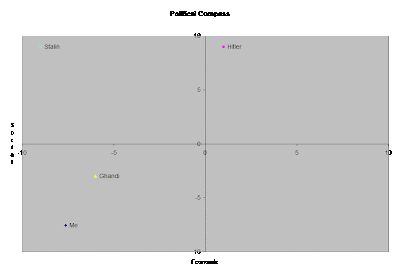Wednesday, February 28, 2007
Students Talking about Books
Students Talking about Books: Mules and Men Edition
P.S. I got the mp3 to work on my Encouraging Student Activism website now. You can go at it either way.
It's not really a podcast, though. I need to set it up so someone could subscribe to it.
Tuesday, February 27, 2007
If I was a professor, I'd be on the Wall of Shame too
For some reason, the graph does not display as a gif, so I have to reproduce it here differently:
Your political compass
Economic: Left/Right: -7.63
As a grad student, I am sure I am below the radar of the College Republicans, or else I might make their Wall of Shame, as our colleague has. (See Western Herald article below.)
I am interested in an instructor's positioning in the classroom. I think most people would advocate for instructor neutrality in the classroom. A teacher is in a position of power and students might feel the need to mirror his politics. While I agree that teachers should not be in the business of creating political clones (something the Right wing fears is happening in American universities), I am not convinced that teachers should remain neutral.
Like it or not, classrooms are public spheres and as such, they are charged with the same politics as the world outside. Teacher neutrality is the same as complicity in the hegemonic status quo. Is it not then the duty of instructors to ensure that alternative viewpoints are heard?
In the literature class I am teaching, I am hoping the alternative viewpoints can be found in the texts I select: Persepolis: The Story of a Childhood; Mules and Men; I, Rigoberta: An Indian Woman in Guatemala. These are not my voices, but they are voices outside of the hegemonic power structure. They are voices that students need to hear.
Ultimately, I want my students to gain the ability to think critically, to analyze the world around them. This can be a painful process, especially when their belief systems are similar to the institutions they are analyzing. With pain comes anger. That anger is often misdirected.
I can deal with that, even if that earns me a spot on the Wall of Shame.
Friday, February 23, 2007
Podcasting Brain Freeze
In the meantime, I am still considering what I'm going to do for my demo podcast this week. I have student conferences on Monday, so I'm considering interviewing them and putting that on a podcast. I could ask them questions about conferencing in general, the writing process, or texts we've read this semester. Hmm... I'll have to think about that. Alternatively, I could do a solo podcast on an educational technology topic.
 All this thinking about podcasting made me decide that I really should be podcasting my poetry shows at Ravenwood. I went to Guitar World to purchase something that would enable me to record directly from the microphone to the computer. I have a cheap little 4 channel Crate PA system and the inputs are somewhat limited. They tried to sell me a $200 solution, which would make sense if I was in a band. However, for spoken word, it seemed overkill. Instead I purchased two cords that split the signal from the mic cable and then divert one of the signals to my computer. For $30 I can now get direct recording to the computer that I can easily turn into a podcast.
All this thinking about podcasting made me decide that I really should be podcasting my poetry shows at Ravenwood. I went to Guitar World to purchase something that would enable me to record directly from the microphone to the computer. I have a cheap little 4 channel Crate PA system and the inputs are somewhat limited. They tried to sell me a $200 solution, which would make sense if I was in a band. However, for spoken word, it seemed overkill. Instead I purchased two cords that split the signal from the mic cable and then divert one of the signals to my computer. For $30 I can now get direct recording to the computer that I can easily turn into a podcast.I can also use one of the wires to connect the mic directly into my computer when I'm not using the PA system. I guess I can return the WMU microphone I borrowed.
Wednesday, February 21, 2007
Tying it all together
Conferencing Topic: How is 5970 going?
Here's the deal: I want to incorporate everything I'm learning in 5970 in my classrooms, but I know that it would both be near impossible and possibly stupid to attempt to do so. It's fine in the context of this course to sample all these technologies, because we are participating in meta-education: we are learning technology so that we can use the technology in our own classrooms. It's not like Allen is expecting us to experience each of the technologies we are learning each week. (At least I hope not.) I just don't think it's a good idea to try to do the same thing in our classes.
I think the first thing I would have to do is decide is what I want the central technology of my classroom to be: a class website? student blogs? a class wiki? a threaded discussion site? Then I would have to match up my objectives of the course with the tools that technology offers. If there are gaps, then I would add a new technology to fill in those gaps. No gaps? Then there is no need for a new technology.
The answer to this question is probably different depending on if you are talking about K-6, 7-12, or college. You need different tool sets when you have students most of the day every day versus part of the day every day versus only a few hours a week.
Above all, student buy-in is essential to creating a meaningful experience. If I decide that my students need to both participate actively (daily) in threaded discussion and keep their blog up to date (weekly?), then I need to demonstrate how those two activities are accomplishing two very different tasks. If I can't demonstrate this, then I should seriously considering using one technology and not the other.
Finally, I think it is important to get student feedback throughout the semester. If a project isn't working, there is nothing wrong with altering the project, dropping the project, or melding the project with another project.
A bit of shameless self-promotion

An Evening with Buddy Wakefield
Sunday, February 25th, 2007
8:00-10:00 PM
Ravenwood Coffee
773 W Michigan Ave
Kalamazoo, MI 49007
(269) 341-4200
$5; All Ages Welcome
Open mic poetry before and after Buddy’s performance
BUDDY WAKEFIELD is the two-time Individual World Poetry Slam Champion featured on NPR, the BBC, HBO’s Def Poetry Jam, and most recently signed to Strange Famous Records.
For more info, contact:
Todd Bannon: tabannon@gmail.com
Wednesday, February 14, 2007
Blogging was OED Word of the Day
weblogging, n.: OED Word of the Day
from Oxford English Dictionary by Oxford English Dictionary
1995 Re: Help! in comp.lang.awk (Usenet newsgroup) 26 Oct., I'm just logging my
web-hits for personal satisfaction and so I can provide some info for the
curious. BTW, I've streamlined and expanded my web logging in the last few days. 1998 InfoWorld (Nexis) 16 Nov. 56d, Bypassing Web
Commander..will prevent you from taking advantage of all of SOS-Pro's Internet
features, including time limits and Web logging. 1999 Web
Techniques July 51/1 Web logging was originally designed for Web engineers to
diagnose problems and measure total throughput, not to provide insights that
could improve the marketing performance of a site. 2002
Economist (Electronic ed.) 6 July 67 Yet just when old media began to feel smug
again about its old-fashioned paper-based products, weblogging (known as
blogging) happened.
NOTE: I'm not sure if the links in this post will work if you don't have an OED subscription. I am subscribed via WMU.
Teaching Writing Wiki
I really want this wiki to be a collaborative effort. I'll be using it for my ENGL 4790 class I'm teaching next semester. However, it would be great if teachers and students at all levels were able to contribute to it.
Teaching Writing
Wednesday, February 7, 2007
RSS implications for the classroom
I'm thinking ahead to the next time I teach my writing methodology class, and the wheels are turning. I'm sure I will add to and otherwise alter this list, but off the top of my head (and fresh from stealing from Richardson), here are some ways I might use RSS feeds next semester:
- Course Readings. Imagine a set of readings for a class that, not only don't need to be printed and copied, but aren't even decided upon ahead of time. I can create an RSS bundle for students to subscribe to and this will become our weekly reading for class. I am not suggesting that I get rid of texts in book form, but RSS bundles could make highly relevant and completely up to date supplementary reading.
- Student-Guided Readings. Why should I do all the work. If students discover interesting feeds in their research, they can share those feeds with the rest of us.
- Aggregated Blog Reading. As Richardson suggests, the aggregated reader is a great way to keep on top of student blog posts without having to go to each site individually to check for updates.
- Student Research. Wouldn't it be great if our research came to us? Oh, yes. This passive, pushed research can't take the place of active research, but it could certainly supplement it.
- Student Publication. Finally, RSS feeds will allow my students to make their work more visible on the web.
Sunday, February 4, 2007
A brief RSS sampling
In the meantime, I thought I'd show an RSS sampling based on the feeds I am currently subscribed to. I have subscriptions to all the ENGL 5970 blogs; news feeds for "student activism, public writing, service learning, PeaceJam, and poetry slam; and I subscribe to some specific sites as well (for instance the New York Times Education section).
My Google reader gives me these top headlines:
- SLAM IDOL (1)
slamidol20070203 - The Slam Idol Podcast - February 3rd 2007 - Wishes by Jannie Jack The Slam Idol Podcast (http://slamidolpodcast.com/) - February 3rd 2007: Show Number 173 - Featuring "Wishes" by Jannie Jack ... - - Google News (3)
Local poet competes in world series of slam - Worcester Telegram Local poet competes in world series of slam Worcester Telegram, MA - Feb 1, 2007 Today, Jackson, 24, competes in her first ...
Erin Jackson - Worcester Telegram Worcester TelegramErin Jackson Worcester Telegram, MA - Feb 1, 2007 Erin Jackson of Shrewsbury made a splash as a member of ... Poetry jumps from page to stage - Vancouver Westender Poetry jumps from page to stage Vancouver Westender, Canada - Jan 25, 2007 Swan is Vancouver’s representative at the ... - The State of Student Activism (2)
Better Get Used to Yahoo ID I met with Bradley Horowitz of Yahoo last week, and the message that came through loud and clear was how important Yahoo ID is ...
The problem with MSM podcasting: Idiotic questions One thing that's great about being a print reporter: You can ask idiotic questions and--with the notable exception of the ...
In total, I have 55 new items since I last checked on Friday, so I obviously have a lot to read.
The following is a list of subscriptions that have given me new items in the last couple days (number of new feeds in parentheses):
- Google News -"Poetry Slam" (3)
- Slam Idol (1)
- GotPoetry (1)
- Google News - "Service Learning" (15)
- Google News - "Student Activism" (18)
- Business Week (2)
- New York Times -Education Section (11)
I see that I made a mistake in my subscriptions. When I was first playing with RSS feeds, I found an article in Business Week called "The State of Student Activism." I subscribed to it, thinking I had found an entire feed on the topic, but what I was really subscribing to was a section of Business Week that happened to have an article on student activism. Now I get feeds from that section, but they are always labeled "The State of Student Activism" even if they're about (as is the case today) using Yahoo ID.
I obviously need to tweak my RSS subscriptions. I need to delete some and I need to get more specific in what I'm asking for. I want my feeds to apply directly to my dissertation work. I don't mind wading through a few articles that don't directly apply, but I definitely won't have time to go through hundreds of articles daily - not if I want to have a life.
Later this week: implication in education
Thursday, February 1, 2007
I'm not sure how I feel about this...
Student’s Recording of Teacher’s Views Leads to a Ban on Taping
I think the student did the right thing in recording his teacher. The teacher had definitely crossed over the line separating church and state. He was imposing his religious views on his students. The student who recorded him knew that no one would believe him without the recording.
However... what do we think about being recorded without our knowledge or permission? What if it was the school administration or the federal government that had been doing the recording? Conservatives are encouraging college students to record their liberal professors to gain ammunition against them. I would be a hypocrite if I supported the student in question here but condemned the conservative students.
I guess I come down on the side of a classroom where students feel safe to express themselves freely. If they feared their comments would be made public on the Youtube, then our discussions wouldn't be as frank and honest.


